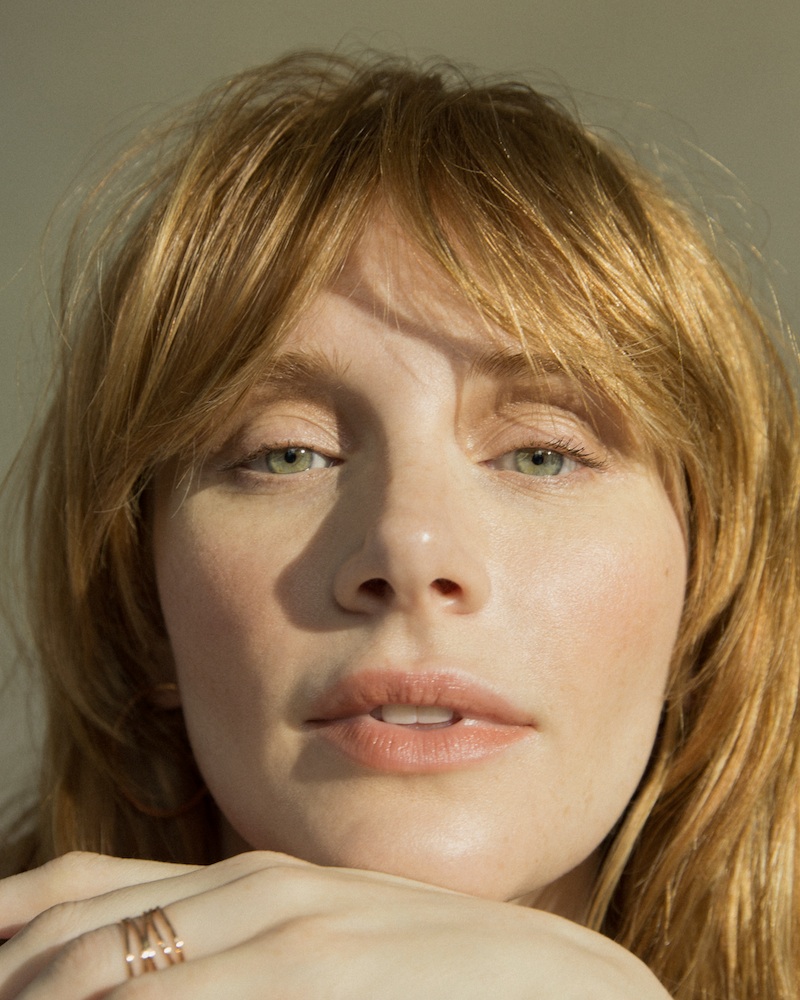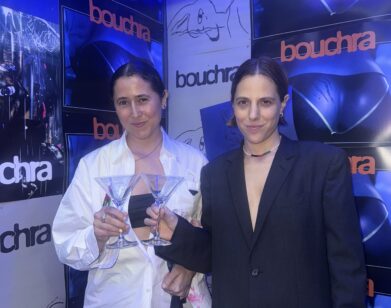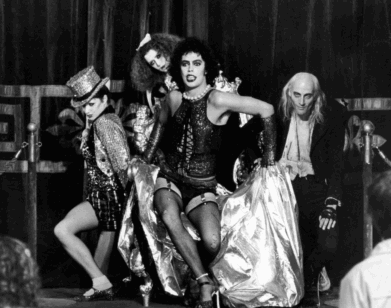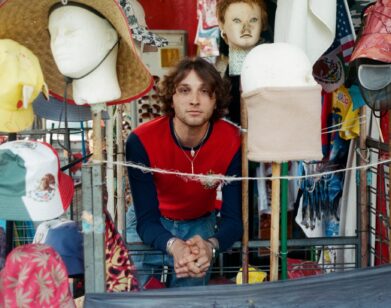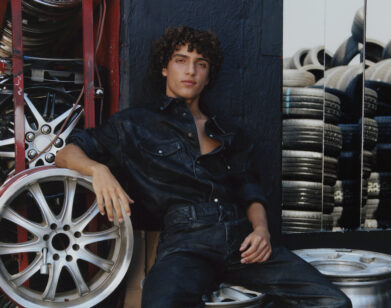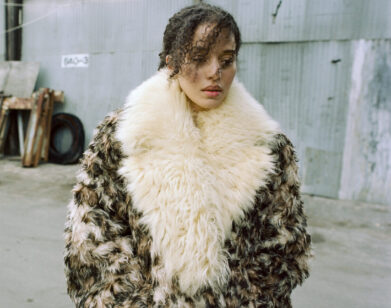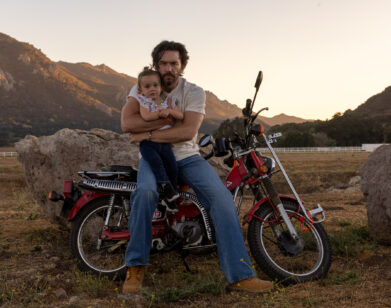Bryce Dallas Howard
BRYCE DALLAS HOWARD IN NEW YORK, JANUARY 2017. PHOTOS: STEVIE AND MADA. STYLING: MARINA MUÑOZ/LALALAND ARTISTS. HAIR: TAKAYOSHI TSUKISAWA. MAKEUP: KATIE MELLINGER USING NU EVOLUTION COSMETICS. MANICURE: MISSPOP USING CHANEL.
Bryce Dallas Howard is at the airport, waiting for her flight to London. She’s about to start filming her next project, the yet-to-be-titled sequel to Jurassic World, and she’s genuinely excited.
Howard’s enthusiasm is understandable; for the last five months, the Westchester, New York-raised actor has spent much of her time on the press circuit. It began in August with her role as park ranger Grace Meacham in David Lowery‘s remake of Pete’s Dragon. Then there was Joe Wright‘s episode of Black Mirror, “Nosedive,” which premiered at TIFF in September and started streaming on Netflix in October. Starring Howard as Lacie, a status-conscious woman navigating a world in which a person’s every interaction gets an Uber-style rating, “Nosedive” earned Howard a SAG Award nomination. Finally, a few weeks ago, Gold, Howard’s film with Matthew McConaughey inspired by the Bre-X mining scandal in the early ’90s, came out in cinemas across the U.S. “I’m definitely okay with doing press,” she explains. “But going into [Jurassic World] is a relief because this is the thing I’ve trained to do.”
The eldest child of high school sweethearts Ron Howard and Cheryl Howard Crew, Dallas grew up on her father’s sets. It wasn’t until M. Night Shyamalan’s The Village in 2004, however, that she made her official acting debut.
EMMA BROWN: I heard that you first met Joe Wright when he was doing Atonement.
BRYCE DALLAS HOWARD: Yeah. It was after he had done Pride & Prejudice and we had a general meeting at the Chateau Marmont. He’s incredible and I’m a huge admirer of his work in general, but specifically his aesthetics and poeticism. I was very effusive and we had a really good time, and then, over 10 years later, he called me and asked to do this part.
BROWN: Were you aware of Black Mirror before Joe called you?
HOWARD: I had watched an episode of Black Mirror almost exactly a year prior to when I started shooting my episode. I was by myself in New Zealand, and my husband was like, “You have to see this show. It’s so incredible.” I have very vivid dreams and nightmares, and my biggest fear is of some kind of dystopian future where we’re advanced in every way except in our humanity. I saw an episode—the second episode, “Fifteen Million Merits” —and I completely flipped out: “This is what my nightmares are made of. This is the most terrifying thing I’ve ever seen.” I sent a video to my husband, bawling my eyes out crying, and I was like, “Baby, I just took a nosedive.” Then, a year later, I was in South Africa, and Joe asked the same exact question that you just asked: “Have you ever seen an episode of Black Mirror?” I went back and played the video for Joe. The episode that I did is called “Nosedive,” and it was a year to the week from when I first watched it. It was just very bizarre, this very weird coincidence.
BROWN: Did you know that Rashida Jones was co-writing “Nosedive”?
HOWARD: No. Joe reached out to me and sent me a treatment, and I said yes on the spot just from the treatment. Within six weeks, I was in Cape Town and there was a script, but I didn’t realize until I received the full script that Rashida and Michael [Schur] had worked on it. It’s a particularly funny episode. Joe and I always looked at it as a satire; it has a lot of comedic elements to it.
BROWN: It made me really uncomfortable about Uber ratings.
HOWARD: Yes! I just give fives, no matter what. I don’t know what it would take for me to give less than a five, but it would be tremendous.
BROWN: Do you ever check your rating?
HOWARD: Before I went to go start shooting, I asked a driver, and they told me that I was a 4.8. I was devastated. I was like, “What? How could I be a 4.8?” Alice Eve, who’s the funniest person on the planet, has admitted to the fact that she’s a focused backseat driver, and she asked for her score, and I guess it was 4.5. She was like, “I was shocked. I couldn’t believe it was as high as it was.” I was like, “Oh my gosh. You’re amazing.” [laughs]
BROWN: Lacie would be so happy with a 4.8.
HOWARD: I know. Lacie would’ve been thrilled, but you just want a perfect score.
BROWN: There were so many great actors in supporting roles in “Nosedive.” I loved that the airline worker was played by Michaela Coel.
HOWARD: Yes! I’d never seen her show Chewing Gum, and I just started watching it five days ago with my husband. I’m in the airport right now and I’m headed to London, and I feel like I just need to go straight to her apartment and give her a high-five for being such an incredible voice and talent, and so outrageous.
BROWN: I was watching your SAG Foundation interview, and I really liked what you said about not having to like Lacie, because Lacie didn’t like herself.
HOWARD: That was a feeling that really worked for her—that feeling of being uncertain about yourself and your choices and your appearance and your performance in life.
BROWN: Was that a difficult emotion for you to access or do you have those moments of insecurity?
HOWARD: We all do, for sure. I’m definitely not very insecure, but I have perfectionist tendencies, and I’ll want things to be a certain way. I’ll run through things over and over and over again in my head and think, “How could I have done that better?” Silly things like that.
BROWN: I was also surprised to hear that Joe Wright has a gratitude journal, which I found amazing.
HOWARD: Yeah. He writes in his gratitude journal every morning. Isn’t that incredible? Joe is so cool, it catches you off guard how sincere he is. You just assume, “This is a guy who knows the best music, has the best taste in clothes, is brilliant, is hilarious, and has the sharpest wit, and a vast intellect.” You would normally be intimidated by someone like that, but he has this sincerity to him that’s very beautiful and soothing. He’s a sweetheart.
BROWN: When people contact you about roles, do they normally cite one particular project that you were in?
HOWARD: I don’t know … The Village did a lot for me, of course, because it was my first movie. Or The Help. But I’m not usually on the call for this kind of thing—I’m usually just present for the begging moments.
BROWN: Have you ever had to really fight for a role?
HOWARD: Yes. Absolutely. With The Help, I knew folks involved in the project peripherally. I wanted to audition for Hilly Holbrook and part of the initial feedback was: “No, Bryce is too nice.” That’s part of the reason why I really love auditions as well —you get to try out a character and try out different versions of a character. You do your best and sometimes you win ’em over and sometimes you don’t.
BROWN: Are you good at getting over it quickly if you don’t win them over?
HOWARD: Instantly. I’ve never, ever, in my entire life, been upset at a casting choice. I started taping my dad’s auditions when I was 11, when he was auditioning actors for one of his movies. I would see, over and over again, that there wasn’t just one actor for the role. It was really clear that there were a lot of people who could play a character really well, and it would always come down to something kind of weird and non-obvious as to why a person was cast. If you’re not right, you’re not right, but that’s okay.
BROWN: I know that you’d been on film sets as a child in various capacities, but when you did The Village, did you feel like you knew what you were doing or did it still feel new?
HOWARD: It was both. I felt very comfortable on a set—incredibly comfortable on a set, which is a real gift because that can be hugely intimidating. What I wasn’t used to was being in front of the camera. There was definitely a learning curve in terms of being on film, but being on a set was all good.
BROWN: Do you think that you can learn how to be a good actor, or do you need something innate within you?
HOWARD: I think everyone has what it takes to be a good actor innately within them. It’s really about connecting to your own humanity and your own behaviors, and getting to a level of self-awareness so that you can have perspective and step outside of yourself and transform and become another person. You can’t become another person if you’re not self-aware; you wouldn’t know what’s changed. [But] the ability to play pretend is something that everyone has access to; you see little kids doing it. On the spectrum of imagination, there are people who are more imaginative than others—I guess some kids are hardcore pretenders and have imaginary friends for years and other kids play and they have fun, but it’s not quite as specific like that. I’m sure there’s a range, but I think everyone can pretend.
I definitely hope that I’m improving. If I’m not, there’s a problem—I’m just coasting. The work that we do is so tricky because it rests on our shoulders, but it’s also collaborative and part of it is trusting the people that you’re working with. Sometimes I think to myself, “I wonder if Meryl Streep is ever like, ‘Oh gosh, everyone thinks I’m so perfect! I wish that someone would give me a note.'” I think that would be its own tricky thing.
BROWN: I’m sure that must be true. With writers, people always complain that their second book is never well-edited because their editor is too afraid to change anything.
HOWARD: Right. It’s like, what, someone’s going give Malcolm Gladwell tips? [laughs] When folks get to the best of their profession, people are like, “Who am I to give a critique to this individual who’s reached mastery?” I’m not there, so I don’t know what that would be like, but I can imagine that being kind of a funny thing for someone who’s creative—it’s not like the questions in our head go away.
GOLD IS OUT NOW IN SELECT THEATERS. BLACK MIRROR IS CURRENTLY AVAILABLE VIA NETFLIX.

